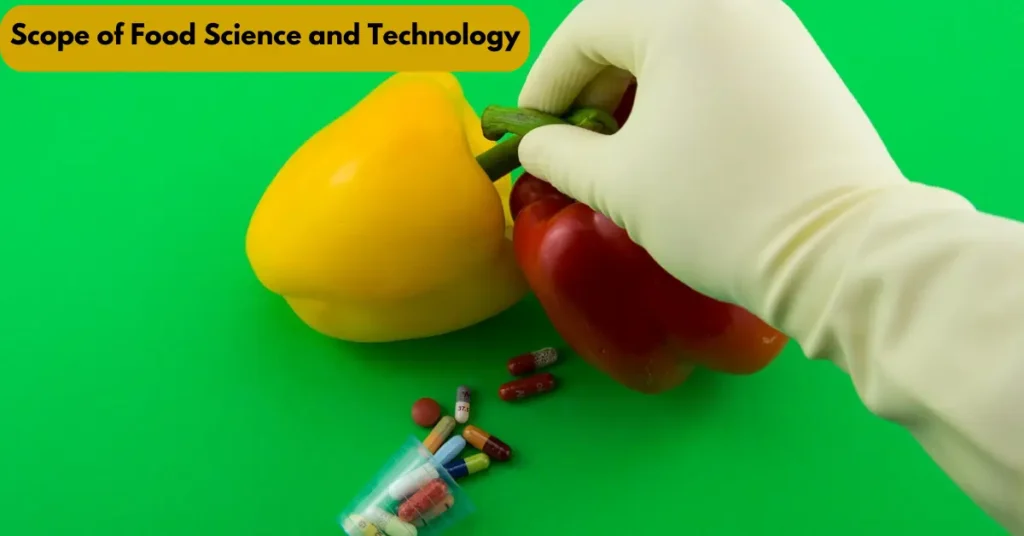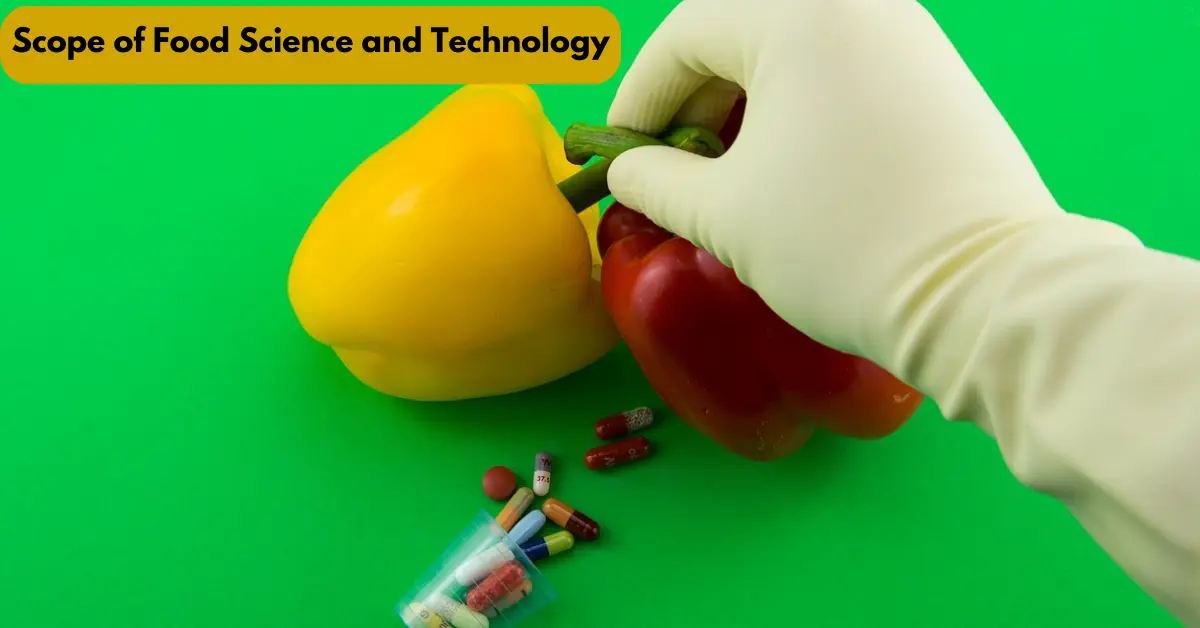In the year 2024, the Food Science and Technology scope (sector) in Pakistan is Full of promise. It plays a role in ensuring food security improving quality and expanding into markets.

This article explores the aspects and vast potential of this industry providing a glimpse into a world where scientific advancements intersect with sustenance creating opportunities, for growth.
Key Aspects of Food Science and Technology in Pakistan
#1. Food Security:
Ensuring that every person, in Pakistan has access to nutritious food is essential for food security. The field of food science plays a role, in finding ways to enhance crop production improve storage methods and minimize post harvest losses.
By conducting research and utilizing technology we strive to tackle the challenges related to food scarcity and distribution to build a secure nation in terms of food availability.
#2. Food Safety and Quality:
Ensuring the safety and quality of our food is of importance. We follow protocols at every step of the food supply chain from farm to table. Food technologists play a role, in preventing any contamination, spoilage or tampering so that consumers can confidently enjoy healthy meals.
#3. Value Addition:
The field of food technology aims to enhance the quality and value of products by converting materials into goods that last longer have improved nutritional benefits and taste better.
Through techniques such, as fortification, preservation, and innovative packaging methods food items not only stay fresh for a period but also contribute to the economic growth of local producers while providing consumers with added value.
#4. Export Potential:
The food industry in Pakistan has significant export potential. With the progress of technology and a commitment, to meeting quality standards, Pakistani food products have the potential to enter the markets.
By utilizing their knowledge, in food science and technology, the country can broaden its export opportunities thereby boosting growth and gaining acknowledgment.
Get more information: Scope of Economics in Pakistan: Career, Salary, Jobs & Fuuture
Domains of Food Science and Technology
a. Food Processing and Manufacturing:
The process of food processing entails transforming materials into food products that can be consumed. In Pakistan, this industry encompasses a range of activities, including cleaning, sorting, packaging and preserving food items.
The use of technology helps in achieving processing methods resulting in a diverse array of food products that cater to both local and international markets.
b. Quality Assurance and Control:
Quality control plays a role, in guaranteeing that food products meet quality standards. This field of food science employs inspections and measures to ensure that food items are safe uncontaminated and in compliance with guidelines. Continuous monitoring and strict adherence to quality control protocols are essential, for delivering high quality food products.
c. Research and Development:
Continuous exploration and innovation are integral, to the field of food science research and development. Scientists and researchers actively strive to enhance existing food products create new ones and improve production techniques. This domain thrives on creativity stimulating advancements, in food technology that ultimately benefit both the industry and consumers.
d. Regulatory and Compliance:
Regulatory agencies establish guidelines and rules to guarantee the safety and excellence of food items. All participants, in the food industry, must comply with these regulations. Upholding food safety laws adhering to labeling criteria and maintaining quality standards are aspects, of preserving consumer confidence and safeguarding the integrity of the food distribution network.
e. Academia and Education:
The field of food science relies heavily on academia and education to shape the generation of professionals. Universities and educational institutions provide programs and courses that equip students with the knowledge and skills needed to succeed in this industry. Additionally, academic research plays a role, in driving advancements in food technology.
Career Path in Food Technology in Pakistan
Food technology is the application of understanding to produce preserve and distribute food. It brings together fields such, as biology, chemistry and engineering to enhance the quality and safety of food. Experts in this area strive to develop creative solutions, for challenges related to food.
BSc Food Technology Course Highlights:
The Food Technology program, known as the Bachelor of Science (BSc), in Food Technology encompasses a range of topics such, as food chemistry, microbiology, food processing and nutrition. This course offers students hands-on experience through laboratory work and opportunities to interact with industry professionals. It equips students with skills that can be applied within the food industry.
Skills Required for Food Technology Course:
Students pursuing a BSc in Food Technology need a range of skills:
- Time Management: Balancing theoretical learning with practical applications.
- Scientific and Analytical Reasoning: Ability to analyze data and solve problems.
- Technological Knowledge: Understanding and operating food processing equipment.
- Research and Organizational Skills: Conducting experiments and organizing findings.
- Problem-Solving Ability: Addressing challenges in food production and safety.
BSc Food Technology Syllabus:
In a food science program students usually cover topics such, as food chemistry, food microbiology, food engineering, food processing, food regulations, quality assurance and nutrition. This enables them to develop a rounded knowledge of the aspects of producing and managing food.
Opportunities after BSc in Food Technology

Various Career Avenues:
After completing a BSc in Food Technology, individuals can explore diverse career paths in the food industry, such as:
- Lab Technician: Conducting experiments and analyzing food samples.
- Research Scientist: Engaging in food-related research and development.
- Organic Chemist: Studying the chemical composition of food items.
- Biochemist: Investigating biological processes in food production.
- Quality Controller/Food Inspector: Ensuring adherence to quality standards.
- Home Economist: Advising on food and nutrition for households.
- Food Product Development Director: Overseeing new product creation.
Advanced Food Technology Courses:
Further specialized courses available after BSc include:
- Food Technologist: Focusing on food processing and safety.
- Nutritional Therapist: Advising on dietary health and nutrition.
- Technical Brewer: Brewing and beverage production expertise.
- Chefs: Culinary professionals specializing in food preparation.
- Product Development Scientist: Innovating new food products.
Evaluating Food Technology as a Career
When deciding on a career, in food technology some factors need to be taken into account to assess if it is the choice:
- Interest and Passion: Assess if you have a genuine interest in food science, technology, and its applications. Passion fuels dedication and perseverance in this field.
- Career Prospects: Explore the job market and growth opportunities within the food industry. Consider the demand for food technologists and related professionals.
- Skills Alignment: Evaluate if your skills align with the requirements of the field. Analytical thinking, problem-solving, and scientific aptitude are crucial.
- Work Environment: Understand the work settings, which can range from laboratories to production facilities, and assess if they suit your preferences.
- Industry Challenges: Recognize the challenges within the industry, such as regulatory changes, evolving consumer preferences, and technological advancements.
- Education and Development: Consider ongoing education and professional development opportunities to stay updated with the latest advancements.
Evaluating these aspects will help you gauge if a career in food technology aligns with your interests, skills, and aspirations.
Exploring Food Technology Courses and Career Scope
#1: Overview of Food Technology:
The field of food technology utilizes principles to enhance the production, preservation and distribution of food. It encompasses a range of disciplines, including chemistry, biology, engineering and nutrition.
#2: Skills Required:
To excel in food technology, certain skills are vital:
- Scientific Knowledge: Understanding the scientific principles behind food.
- Analytical Thinking: Ability to analyze data and draw conclusions.
- Problem-Solving: Addressing challenges in food production and safety.
- Technological Proficiency: Operating food processing equipment.
- Communication: Conveying ideas and findings effectively.
#3: Eligibility Criteria:
Entry into food technology programs typically requires completion of high school with a strong background in science subjects like chemistry and biology.
#4: Food Technology Syllabus and Subjects:
The curriculum covers diverse subjects such as food chemistry, microbiology, food engineering, nutrition, food laws, and quality control. These topics provide a comprehensive understanding of food production and management.
#5: Popular Electives in Food Technology Courses:
Students often have options for specialized electives, such as food microbiology, food product development, food packaging, and sensory evaluation, allowing them to tailor their education to specific interests.
#6: Types of Courses Available:
- Masters Level Courses: Offer advanced knowledge and specialization in specific areas of food technology.
- Doctoral Level Courses: Focused on research and innovation, contributing to the advancement of the field.
Education Institutions for Food Technology
Top Colleges for Food Technology Courses in Pakistan:
- Government College University – Faisalabad: Offers comprehensive programs in food technology with modern facilities and experienced faculty. Provides hands-on training and industry exposure.
- Dadabhoy Institute Of Higher Education – Karachi: Known for its focus on research and innovation in food science. Offers diverse specializations and internship opportunities.
b. Top Universities for Food Technology Courses Abroad:
- The Islamia University Of Bahawalpur: Renowned for its advanced food technology programs. Provides global exposure and opportunities for research collaborations.
- University Of The Punjab: Offers a wide range of food technology courses with state-of-the-art facilities. Known for producing industry-ready professionals.
Prospects and Scope in Food Technology
Job Profiles & Salary:
- Food Technologist: Involved in food production, quality control, and research. Average salary ranges from [salary range].
- Nutritional Therapist: Advises on dietary health. Average salary ranges from [salary range].
- Technical Brewer: Specializes in beverage production. Average salary ranges from [salary range].
- Chefs: Culinary professionals. Average salary ranges from [salary range].
- Product Development Scientist: Innovates new food products. Average salary ranges from [salary range].
The field of food technology, in Pakistan, provides a range of job opportunities with salaries, in different roles. Many known companies actively hire food technologists and other professionals to work in research, development, quality control and production.
Read also: Scope of Architecture in Pakistan: Make Your Career
Final Thoughts:
In Pakistan, the field of Food Science and Technology has emerged as a hub of innovation and opportunity in 2024. It plays a role, in ensuring food security and exploring markets showcasing its immense potential.
This field encompasses aspects such as food processing, quality control, research, education and regulatory compliance offering a range of career possibilities. With institutions both domestically and internationally individuals aspiring to excel in this dynamic industry can acquire the necessary skills.
The diverse range of job roles along, with salaries, emphasizes the bright future and continuous growth that lies ahead for Pakistan’s food industry by combining scientific knowledge with sustenance.
FAQs: Scope of Food Technology Pakistan
Yes, food science and technology in Pakistan offer diverse career avenues, addressing food security, quality, and innovation, making it promising.
Salaries for BS Food Science and Technology jobs in Pakistan vary, averaging around PKR 30,000 to PKR 120,000 per month, depending on roles and industries.
After a BS in Food Science, explore roles like food technologist, quality controller, researcher, product developer, or pursue advanced degrees for specialization.
Countries like the USA, UK, Canada, Australia, and the Netherlands offer top-tier programs, research opportunities, and diverse career prospects in food science and technology.
To become a food inspector in Pakistan, pursue a relevant bachelor’s degree, gain experience, and apply for positions in regulatory bodies or government agencies.

